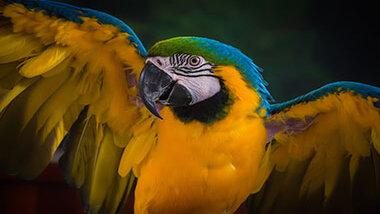When you bring a new parrot home, you set yourself up for a friend for life. Because parrots can live as long as their human companion and sometimes longer, but it depends on the species you choose.
Domestic parrots range in size from the palm of your hand to the size of a cat. These cute birds are very talkative and intelligent. If you are going to adopt a parrot, you must know their requirements in order to take care of them.
In this article, we will discuss what the average lifespan of a pet parrot is and what you can do to improve it.
Average Lifespan of Parrots
Parrots have a special position among pet birds because of their potential to be with their owner for a lifetime. Some parrots live longer than their owners. Many people think that parrots live longer in the wild because they will get an open environment. Well, this is not true.
Those parrots that live in houses and zoos live longer than their friends that live in the wild because a parrot that lives at home will have less chance of encountering a predator or disease. But that doesn’t mean they never get sick in captivity.
As a general rule of thumb, the larger the bird, the longer its lifespan. Below is the life expectancy list for common parrots. The average life span of parrots listed below is for those birds that are kept in ideal conditions.
- African Gray Parrots can live up to 40 to 60 years
- Macaws 30 to 50 years
- Amazon Parrot can live up to 25 to 75 years
- Caiques Up to 50 years
- Cockatiels 10 to 15 years
- Budgerigars (Parakeets) can live up to 5 to 18 years
- Cockatoos 20 to 60 years,
- Canaries 10 years
- Finches typically 5 to 9 years sometimes longer
- Eclectus Parrots can live up to 30 to 50 years,
- Lovebird 10 to 15 years
- Lorikeets (Lories) can live up to 10 to 30 years
How can we improve the average life span of parrots?
Common factors on which parrots lifespan depends are veterinary care, handling, nutrition, and physical and mental health. If we can improve them, we can increase the lifespan of our pets.
Management
A parrot can grow well if you provide it with a clean and safe living area and plenty of space to fly and spread its wings. Parrots also need a lot of full-spectrum light or natural sunlight because natural light allows your pet to process nutrients, and the day and night cycle is also responsible for their mental well-being.
Some parrots do not like living alone and need to stay with other birds because they are species of flocks. If you think you are living with your pet and your parrot doesn’t need another companion, that’s wrong, no matter how hard a human tries, they can’t replace another bird.
Health
Always buy birds from a trustworthy breeder because they can provide you with all the genetic and health information about your breed. Bird genetics play an important role in the longevity of birds.
Vaccinate your parrot at a young age and then follow the annual vaccination schedule to keep your bird in perfect health. If you found any symptom of illness, contact your vet as early as possible.
Nutrition
Nutrition plays an important role in the health and long life of the parrot. The parrot’s regular diet includes seeds, grains, pellets, nuts, vegetables, and fresh fruits. A balanced diet that contains all the proteins, vitamins, and minerals is necessary to maintain proper health.
Never give your bird a diet that consists mainly of sunflower seeds, as it is one of the worst diets for birds. Parrots often adore this diet, but it is full of fat and contains few nutrients.
Oldest Parrot Till Now
There are many parrots that live long and healthy lives, but a couple of them become very famous.
Alex, a famous parrot that is also used in the avian language experiment. This parrot was purchased by Dr. Pepperburg and lives for up to 31 years.
A cockatoo named Cookie holds the gunnies world record of the oldest living parrot. He died at the age of 83 in 2016 and lived his entire life at the Brookfield Zoo.
Final Thoughts
Parrots are not recommended as pets for people and young children who have uncertain life circumstances. If your parrot has a life expectancy of 50 to 60 years, you should make a proper plan for its care, handling, vaccinations, and regular veterinary checkups. If you think you cannot take care of a parrot for that long, adopt an old parrot.




